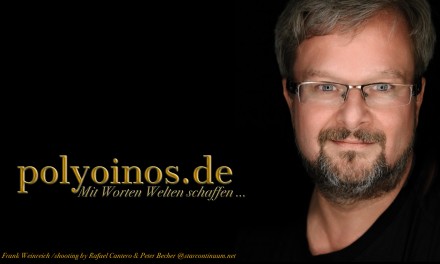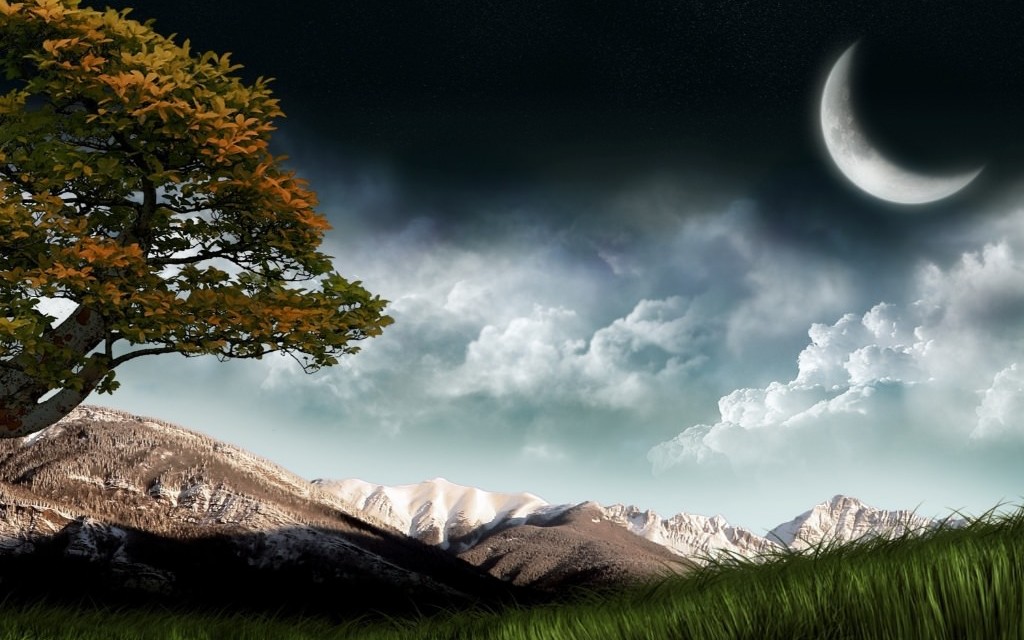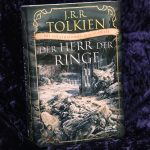I hear the horns of Elfland every day.
(Lord Dunsany: The King of Elflands Daughter)
Fantasy
Definition, History, Characteristics and Meaning
© Frank Weinreich
Fantasy – the genre of unlimited possibilities – in fact is one of the most successful genres in literature, media and arts in the last 50 years and we all know what fantasy is – or do we? Well, on closer inspection and especially seen through scrutinizing academic eyes, we see that it is not quite as easy to define fantasy as one may think at first glance. Fantasy – yeah, of course – it is Tolkien and Middle-earth and Hobbits and Gandalf, it is Harry Potter and Hogwarts and Voldemort. Yes, and of course dragons and stuff.
But what about Bella and Edward? Is that fantasy?
Well, I know people who are quite offended by that idea. And what about Luke and Anakin Skywalker, Padme Amidala and Obi Wan Kenobi? Is that fantasy? No – so people have told me. They told me: “You could also call James T. Kirk an Elfking or Spock a wizard if you say that Star Wars is fantasy. No, that´s Science Fiction”, or so I was told at least. Okay – but I´d still insist that Star Wars is fantasy and Star Trek is not. Though you could also make a point in insisting that what happens at space station DS9 isn´t SciFi any longer.
So what do we make of all this?
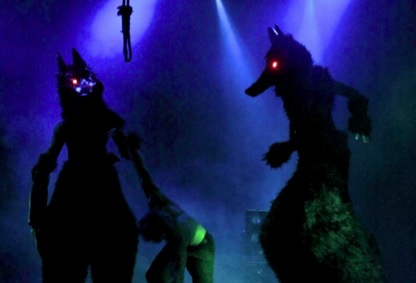
The highly experienced editor of fantasy literature Helmut Pesch from the Lübbe Verlag, Cologne, argues convincingly that there is no such thing as a fixed canon of genres in literature (personal communication). We still need genres when discussing art and literature, he´d go on, but we have to face the fact that they do not possess fixed boundaries and instead are floating corpuses which tend to mingle not only at the edges.
Genres exist within boundaries which they try to break free from, because that is what the creative process of writers and artists is about: breaking free and building something new. So what makes you think that you are able to constrain works of creative thinking within well defined spaces? Forget about that.
But this does not mean that genre is not a useful term to think about. There is no such thing as a discussion about art and literature which is able to abstain from classifying their topics. So go ahead and classify, define, build genres. You should only keep in mind that the terms are a bit fluid and that one time or another you will have to repeat and perhaps re-evaluate your understanding of genres and their boundaries.
Having said this, I hope it seems to still make sense to have invited me to give a talk about the genre of fantasy literature and, to a lesser extent, about its kin in the department of fantastic literature and art, such as for example science fiction, fairy tale, horror, myth and legend.
I would like to proceed as follows. First I will give a definition of fantasy, then I will briefly sketch the history of fantasy literature and art. In this step I will give a very few and very short examples of outstanding works of fantasy. Outstanding not necessarily because of their artistic quality, but because of the impact they have had.
Please let me apologize in advance for not mentioning your favourite authors, directors, movies and books – this is a totally subjective choice and you can easily exemplify what I will point out in the following with most works of fantasy, just as you see fit.
What I do want to come to after talking about the history of fantasy are the potential functions fantasy may fulfil for its audiences. For many people fantasy is not just entertainment, but runs deeper, and I will talk about that in the third section of my talk before concluding with an observation about fantasy and fantastic literature and art as a whole: the fantastic is not fantastic.
Before I begin with the definition, please allow me one word about my somewhat annoying habit of talking all the time about fantasy literature and art. I think it is important to thus emphasize that I do not talk about just books, but about all artistic forms of expression of the fantastic. What I say applies to books just as well as it applies to movies, and computer games, pen and paper role playing games or live re-enactments. And it also applies to music, pictures and sculpture.
But now let´s get down to work. What is this thing called fantasy? A very early attempt to characterize fantasy from Everett Frances Bleiler in 1948 (Checklist, 3) states that “Fantasy may be almost all things to all men”, and Helmut Pesch, in a canonical dissertation on fantasy in 1982 (Fantasy, Kap. 1), reiterates that there is no such thing as a widely agreed upon definition of fantasy. There are many more attempts in literature to avoid the definition problem with observations of this kind. They still do not seem very helpful, though. Although I said at the beginning that genre definitions and boundaries are fluid and need to incorporate a certain kind of flexibility, it would nonetheless be nice to do better than just saying that fantasy are the books which the bookseller places in the shelf that is labelled fantasy.
And, of course, there are definitions around out there in secondary literature, earlier mentioned concerns notwithstanding. But most of those do not cover the whole terrain of fantasy. Fantasy tells chivalric tales as well as talking about demons in post-apocalyptic settings or taking us on voyages imaginaires into brains of otherdimensional beings. Fantasy tells of books coming to life and depicts the wizard living next door. So the definition has to cover all this ground and more, and most definitions do not succeed in accomplishing this. Darko Suvin published a study on science fiction in 1979 (Suvin Poetik, 42) in which he called the fantastic as a whole “metaphysical literature”, and I thought that this was the track on which fantasy as a specific sub-genre of the fantastic might be found. Science Fiction can be metaphysical literature, but it must not and for the most part is not metaphysical. But Fantasy … that´s quite another thing.
By metaphysical literature Suvin refers to literature and art that deals with or depicts supernatural phenomena, things, beings, actions which are not compatible with natural laws. Orwell’s 1984 in its time was science fiction of course, but there is nothing supernatural about it, as modern public relation campaigns prove. But dragons and wizards and sparkling vampires are supernatural things and wars in heaven or hell are supernatural events, and these are exactly the things which inhabit fantasy stories. They inhabit fantasy to an extent which marks the occurrence of supernatural content as the defining attribute of the genre. Fantasy is a story, movie, game or piece of art, which incorporates supernatural phenomena as an important part of its content, which can assume different roles, but without which it would not function.
This is one half of the definition of fantasy. Please let me dwell one moment on a particular aspect before I introduce the second part of the definition. I said the supernatural is to be found in the content of the art in discussion. That´s an important point, since this means that the definition is dependent on an act of interpretation regarding what is told or shown in fantasy. There are other approaches of scientific analysis, especially in literature, and if you take one of those paths, the definition of fantasy as I have given it does not make sense anymore.
One approach is the structuralist approach with which you are to some extent familiar, I assume. Structuralist theories have proven especially fruitful in researching fantastic literature which fantasy, of course, is part of. Russian structuralists and their predecessors have analysed fantastic literature since the beginning of the twentieth century. Then, in 1970, Tzvetan Todorov published his Introduction á la literature fantastique, the most influential work on fantastic literature, which just recently has been significantly augmented by two studies by Uwe Durst, Theorie der phantastischen Literatur and Das begrenzte Wunderbare. Durst and Todorov define and analyse fantastic literature by looking for certain defining traits within the structure of the texts. They do not look at its content. One time Uwe Durst told me that basically he is just not interested in the content of a story, only in its structure and the way it is composed. When working with a piece of art in the structural way of thinking you still have to do some interpretation, but to a much lesser extent than if you try to show in an objective way what the text actually is about. Using the structuralist way of analysis, you get harder data. Todorov characterizes his approach as an analysis of the structure of the text which scrutinizes its “poetics” and terms the analysis of the content of a text as the “interpretation” of its “meaning” (141), which of course is always wide open to discussion.
What I do when I work on a piece of fantasy is the interpretation of its meaning, as disregarded by Todorov and Durst as soft data with little or no objective value. But I think it is nonetheless the only way to reach the core of fantasy and what fantasy is about. And it is in fact the approach which the vast majority of researchers in fantastic literature have chosen, because fantasy is about meaning and not much more. People enjoy and consume fantasy less because of some traits of its structure than because of its contents. People long for the thrill of supernatural horror, they search for the beauty of invented fairy worlds and they want to witness epic struggles of good against evil which extend beyond the physical world into the realms of gods, demons and magic. Whatever fantasy may do with its audiences, it does it because it tells stories in which the supernatural is an essential thing, and so you have to take the interpretational path in approaching fantasy if you want to get to know what fantasy does. As a result of this approach, you may gain not much more than a “fuzzy set” of descriptions with the wondrous at the core of a given story, as Brian Attebery has pointed out (“defined not by the boundaries but by a center”; Attebery 12), but that can be enough to get hold of the genre.
And in fact it is not as arbitrary to interpret the contents of a fantasy story or movie as Todorov or Durst seem to believe. Actually, we do know a lot of things in our time and we especially can be quite certain about what the supernatural is and what it is not. We do know that biology and the physics of flight make it impossible for the classical dragon to exist, even though Anne McCaffrey in Dragonflight tries to give a scientific explanation (Dragonflight, by the way, is science fiction, not fantasy, and with regard to the explanation of men-carrying lizards it is not very good science fiction). We do know that magic is not going to work in reality, though what magic is may be the topic of discussion as Arthur C. Clarke has observed so brilliantly. We do know that no fairies appear in the real afternoon sun of our world to grant wishes, regardless of how great one’s need of them may be. As always, there are some things and topics at the limits of reality and imagination, which may be hard to pin down on either side, but in general it is very easy to discern whether a story talks about things supernatural or whether it does not.
Whether or not it is possible to discern this on the other hand depends on the level of knowledge the audiences possess. Therefore what is fantasy at one time may not be regarded as fantasy in another time. Take for example every hard core space flight novel from the twentieth century and tell it to people from before the time Copernicus had published the Commentariolus. Before then, people were convinced of the truth of the geocentric world view and a story in which a space ship takes off from a planet orbiting its sun would be a story set in an absolutely weird and twisted universe, probably of satanic origin and thus fantasy of the most despicable kind. What fantasy is may thus shift in hindsight, but for most sorts of analysis and research you have to take into account what author and audiences knew when a story or piece of art was conceived, and then it is comparatively easy to discern whether or not a given thing is fantasy or not.
With regard to the second half of the definition of fantasy, which I have not given so far, it is also crucial to know what levels of knowledge the authors and audiences possess. It is important since there is something like ‘true fantasy’ – in a certain sense. By true fantasy I mean myth and mythological beliefs in times gone by and faith back then as well as today.
Myth back then was believed to tell true stories, faith today expresses beliefs about certain supernatural things and circumstances. Religious and mythological assumptions are not compatible with the scientific and empirical world view in the same way as the matter of fantasy stories is not compatible with it. As well as myths once did, faith today claims that its legends, parables and the history it tells about are true; that they did and do happen exactly as they are told. The decisive point with fantasy is that fantasy does not claim its stories are true. Fantasy stories necessarily are fiction. Good fantasy does have a claim of utter sincerity and tells coherent stories which take their mythopoeic endeavours seriously. There is truth in fantasy, but it lies within the stories. With reference to the real world we live in, its contents are fiction.
And so we can expand our definition of fantasy as follows: First: Fantasy is a story, movie, game or piece of art which incorporates supernatural phenoma as an important part of its content which can assume different roles but without which it would not function. Second: Fantasy is fiction.
With regard to the history of the genre, about which I would like to talk now, one can say that fantasy is the progeny of myth. Myth in ancient times was a means to explain the world as a whole. And myth´s task also was to console and cheer people in the face of the dramatic tides of fate, which man could not comprehend in the way we do today: famine, war, plague, injustice, natural disasters as well as more pleasant incidents like a plentiful harvest, health and numerous offspring. But myth was also entertaining. From the beginning, myths also were good stories, which made for a good time at the campfires in the stone age, on the agorae of ancient Greece, the forums of the Roman Empire and in front of the fireplaces of medieval castles. It is my belief that the folk that listened eagerly to the myths of ancient times did so not only for their spiritual and educational value but also because they liked a good story the same way we do today; and myths regularly are good stories which tell of those things which move mankind most effectively. There are only so many gripping topics – love, hate, betrayal, courage, sacrifice, greed, altruism – and myths tell them all. And they tell them on a scale larger than life, which makes for an astounded and fascinated audience back than as well as today.

Stories told in medieval castles …
So in a way fantasy begins in the caves and at the camp fires of the stone age, but only in the sense of being the progeny of the myths told then. Fantasy is not myth because no spiritual effects are intended and an educational moment might be intended, but it is by no means a defining or necessary characteristic as it was in myth. Fantasy is myth no one believes in. Though one might say it is myth no one should believe in, because time and again I do experience fans who seem to forget that fantasy is fiction.
So in a way fantasy begins in the caves and at the camp fires of the stone age, but only in the sense of being the progeny of the myths told then. Fantasy is not myth because no spiritual effects are intended and an educational moment might be intended, but it is by no means a defining or necessary characteristic as it was in myth. Fantasy is myth no one believes in. Though one might say it is myth no one should believe in, because time and again I do experience fans who seem to forget that fantasy is fiction.
But fantasy is fiction and this also distinguishes it from one of its direct predecessors, the gothic novel, which very much likes to play with the ontological status of the occurrences it reports. Fantasy in its beginnings abstained from playing with reality, instead it invented whole different worlds of magic and weirdness, which stated unmistakably that they lead beyond the borders of reality. Which fantasy´s most influential cousin in the realm of the fantastic, the genre of science fiction, deliberately does not. Its other direct predecessor is romanticism, which instead shares the supernatural topics of fantasy. Romantic authors most of the time were in search of the supernatural and the enigmatic, but they searched for it in our world. The best expression of this attitude is to be found in a saying of Novalis, when he claimed: “Indem ich dem Gemeinen einen hohen Sinn, dem Gewöhnlichen ein geheimnisvolles Ansehen, dem Bekannten die Würde des Unbekannten, dem Endlichen einen unendlichen Schein gebe, so romantisiere ich es” (Novalis II, 334). Fantasy instead invents its own worlds, fantasy is an act of sub-creation as J.R.R. Tolkien put it in 1937, when fantasy thanks to Tolkien himself began to outgrow its first clothes.
At the beginning of the genre fantasy George Macdonald and William Morris have to be mentioned, who wrote the first full-scale fantasy books in the second half of the of the nineteenth century. Especially Morris with The Well at the World´s End (1970; first ed. 1896) and The Wood Beyond the Worlds (1992; first ed. 1894) “shows already many characteristics that have come to be permanently identified with fantasy” (Mathews 2002, 38) – a medieval setting, magic, a quest and supernatural influences. Today McDonald and Morris are mostly forgotten insofar as fantasy is concerned, in other aspects both are still influential thinkers, especially Morris who was a noted artist, architect and political reformer besides his work as a writer. And the fantasy of both writers is not very noteworthy, since it did little else other than be the first of their kind.
The first really great work of fantasy, which captures the probably strongest effect of fantasy literature, is Lord Dunsany´s masterpiece The King of Elfland´s Daughter from 1924, still one of the best books of fantastic literature ever written. And the effect I am talking about is the power of enchantment. J.R.R. Tolkien who, besides being the most influential fantasy author with his Lord of the Rings, also was one of its most important theorists, called enchantment the crucial and most noble function of fantasy. And indeed, besides certain aspects I will dwell upon later, this is probably the most attractive thing about fantasy: it tells about wondrous and magical worlds and events and thereby enchants its audiences for the duration of their stay in the books or the films or the games. Enchantment is what Novalis in the quote above described as mysterious appearance, as the unknown, and as infinity.
And that is exactly what The King of Elfland´s Daughter is about. Elfland as story is a visit to this otherworld, which carries the reader into this unknown which reveals itself as a most beautiful albeit perilous realm. It tells the story of a young prince of our real world who enters fairyland, wins an elfish woman for a wife, brings her into our world and has to discover that despite love and care neither can live in the world of the other one. Elfland and reality are incompatible and it turns out that this is the great tragedy of both worlds. Dunsany finds that the project of romanticism has failed and that this failure dooms man to a world so poor that it is nearly unbearable. The King of Elfland´s Daughter was written after World War I, in which Dunsany served as officer in the infantry. In my opinion the book has to be counted among the great works inspired by the experiences men had in the Great War. As a side remark let me point out, that The King of Elfland´s Daughter is written in a thoroughly poetic language of unsurpassed beauty, which alone makes it a worthwhile reading, at least as long as you read the original book.
There are other examples of fantasy from the time after the Great War, even very distinguished ones like The Worm Ouroboros by E.R. Eddison or the really fantastic, weird and disturbing Voyage to Arcturus by David Lindsay. Both had a strong impact on the genre at a later point. But with regard to the timeline of fantasy what came next, was the development in the USA in the Twenties and Thirties of the Twentieth Century.
This was the time of pulp magazines and with them came the Golden Age of Science Fiction. But it was not only about SciFi in those days, in fantasy also some remarkable authors made their appearance. The most popular of those were Howard P. Lovecraft and Robert E. Howard.
While it is not quite clear if Lovecraft and his Cthulhu-Myths are fantasy, especially regarding the given definition, Lovecraft´s works still contributed greatly to the genre. There are no overt metaphysics in Lovecraft. Instead he mostly tried to give at least pseudo-scientific explanations for the strange things and beings he invented. But the powers and powerful beings of his myth contradicted even the scientific knowledge of his time and his work is often described as supernatural horror. It can be said that Lovecraft at least ventured on the borders of fantasy. On these borders he created his own, very dark and disturbing kind of enchantment, but an enchantment nonetheless. This inspired a whole branch of fantasy literature (August Derleth, Clive Barker, H.R. Giger, Wolfgang Hohlbein), which makes up an important part of dark fantasy, although Lovecraft was not the first author in this territory. Lovecraft for example was inspired by Clark Ashton Smith, a British author of dark fantasy (the Zothique series), who began his work a decade earlier than Lovecraft (though later on, Lovecraft inspired Smith).
Robert Howard´s heroes constitute a fine and underestimated piece of fantasy, especially his most successful protagonist, Conan, the Barbarian. Howard had a very brief time to write his stories since he committed suicide at the age of 30. And this short time was overshadowed by personal and countrywide economic disasters during the Great Depression in the Thirties. Patrice Louinet remarks: “The biggest part of Howard´s work can be understood as variations on the topic ‘barbarism versus civilization’, and Howard definitely stood on the side of the barbarians” (Louinet 19, my translation).

… not quite clear …
Howard´s heroes face treacherous and sinister adversaries which impersonate civilization, and they rely only on their personal strength of mind and body in these struggles. Howard´s heroes take their lives in their own hands relying on no other thing than themselves – that was something which the thousands of people in the unemployment lines of the early Thirties might very well have dreamed of.
This aspect is an important point one finds throughout all of fantasy: struggle as a very personal issue. All of fantasy is characterized by personal struggles. In Howard it is epitomized as physical prowess, which overcomes the machinations and plots of tyrants and sorcerers, which rely on soldiers or the summoning of armies of the dead to do their work for them, but not on their very own personal strength.
The topic of struggle as personal issue can be found everywhere in fantasy. Whether it is Frodo´s fight against the power of the Ring or Harry Potter versus Voldemort – the depicted conflicts are always a test of the strength of the protagonist. And although the protagonist might be a sorcerer with deadly fire bolts at hand or a warrior wielding a sword with supernatural power – the power of the bolts and the power of the sword usually are determined by the power of the wielder. It is a topic known from saga: the sword was plainly there, embedded in the stone, but only Arthur had the strength to acquire it.
Not all of fantastic literature works like this, although saga, legend and fairy tale certainly do, but these are very close to fantasy, anyway. Horror on the other hand usually plays with the breakdown of personal strengths and beliefs. And Science Fiction with regard to conflict is a kind of an antagonist to fantasy, at least the philosophical and political works of SciFi. In SciFi conflict more often appears as a struggle between the individual and circumstance or it discusses the competition of concepts and ideas.
SciFi therefore has the means to criticise certain socio-political developments, as for example Jewgenij Zamjatin did in We, as George Orwell did in 1984 or Aldous Huxley in Brave New World. SciFi also is a great testing field of sociological, technological and political ideas. Nowadays discussions in bioethics seldom forego the chance to explain their arguments by revealing scenarios taken from SciFi and with their aid showing which turns developments might take. Fantasy can do this also, and SciFi can also focus on the individual and their strengths and needs and fears. But typically fantasy focuses on the individual and explores his behaviour. This dates back to the Greek philosopher Plato, who told fantasy stories in order to explain his system of ethics. It also was the Greeks who coined the motto which might as well stand above fantasy literature in general: Gnothi seauton. That means “know thyself”, and indeed fantasy explores the self of man by putting him in existential situations which threaten not only his life and that of his beloved ones and his people, but also his immortal soul which, in contrast to reality, in fantasy can be presented as a matter of fact.
The importance of the individual and his or her struggles are of course an observation which is true for many genres, and so it would make a poor criterion for the definition of fantasy. But it is an aspect which explains some of the appeal fantasy holds for its audiences. Modern life is just not a life where personal strength of mind and will makes a difference, since we experience that impersonal powers in unknown offices filled with faceless bureaucrats are the driving forces behind everyone´s daily lives. The reality of modern life is much more akin to SciFi dystopias than to fantasy. So diving into a preindustrial world and witnessing examples of personal bravery make for a fine entertainment or even a good role model. Especially when it is made up so touchingly and offers scope for identification like Frodo´s struggle with the Ring. Frodo is the embodiment of common man, whose struggles in the end matter more than all the councils and orders of kings and wizards. It is no wonder that since then, Frodo has lived through a thousand incarnations such as Pug the Magician, Shea Ohmsford, Eragon and other folks like those.
Frodo was a Hobbit, and Hobbits are people that possess an inner strength that their author, J.R.R. Tolkien wished his fellow man to have, and which he saw in some people, especially during World War I. While Conan had just conquered his world in grand style, Tolkien in 1937 invented these small heroes, which in effect turned out to be the most attractive heroes in all fantasy. But it was not until a few years following the publication of The Lord of the Rings in 1954 that fantasy grew into the successful genre it is today. And this overall success depended to a great extent on the single success of LotR.
The Lord of the Rings is the epitome of fantasy literature and some people said that after the Ring you could only write fantasy like Tolkien or deliberately not like Tolkien. This is due to a variety of facts. The first thing is that Tolkien created a world of great depth, which appears both credible and desirable. Two years ago I undertook a content analysis of LotR and found that 34 % of the text consist of mere descriptions, which do nothing to drive on the plot. The second point is an optimal balance between familiarity and enchantment in Middle-earth. The world Tolkien created is very similar to our world but still has enough components of Elfland in it to provide the fascination which makes the reader enter it as far as possible. The third point is the epic structure of the plot, which derives from the millennia old corpus of sagas, which has captured man’s imagination at all times. This Tolkien combines with modern aspects like the crucial role of common man and the importance of friendship and cooperation throughout the story. This appeals to our modern understanding of individuality and society and thus facilitates identification and compassion with people and events. The fifth point, and this is not necessarily the end of the list of important reasons for the success of LotR, the fifth point is the timelessness of greater as well as minor topics the story tells of. By that for example I think of the struggle of good versus evil, which Tolkien does not talk about in plain pictures of black and white. I think of the ethics as are expressed in the behavior of Gandalf, Denethor, Saruman, Frodo and Gollum. I think of the wider scope he provides in the background material as published in the Silmarillion or in the more or less 6,000 pages of the Complete History of Middle-earth. There for example immortality is made a topic, as well as art and creativity discussed. And one must not forget that Tolkien wrote about writing and the creative act in an enlightening way, which inspired a host of authors to try their luck in the sub-creative process, though this is beyond the narrower reasons for the success of LotR. All in all, Tolkien´s writings are a rich trove to dig in, and this Professor from Oxford University definitely is the one who had the single greatest impact on fantasy art.
This, by the way, was not known as fantasy in the times of Tolkien´s writing. In the Sixties of the last century Lin Carter published a series of books under the title of “adult fantasy” and it was not before then that the genre received its name (Weinreich 63). Up till then some good fantasy was written independently from Tolkien. Some is still in print, like for example Fritz Leiber´s stories about Fafhrd and the Grey Mouser. Or the Gormenghast trilogy by Mervyn Peake, which is absolutely not mainstream fantasy and definitely hard to understand. But most fantasy from 1965 on had a Tolkienian flavour for the next thirty years. In 1965 LotR became a roaring success in the USA because of an unauthorized publication by ACE Books and its aftermath. After that it spread throughout the world and became the bestselling work of fiction of all times. And many authors followed in that wake.
Most of those were entertainment only, and some of them were good entertainment. But the most remarkable works of fantasy after Tolkien had little to do with his style of High Fantasy. Despite a permeating sense of melancholy, Tolkien´s work at the core is an optimistic one. Tolkien himself once wrote that fantasy mirrors the great Christian story of creation and salvation and thus has to have a happy ending as had the arrival of Christ, albeit possibly accompanied by tragic events (cf. On Fairy Stories).
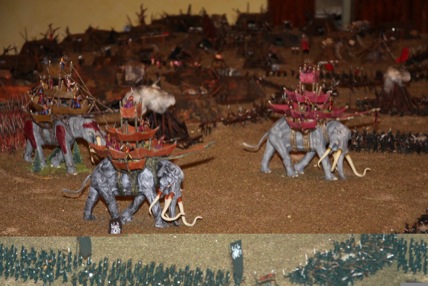
… Tolkienian flavor …
Most of those were entertainment only, and some of them were good entertainment. But the most remarkable works of fantasy after Tolkien had little to do with his style of High Fantasy. Despite a permeating sense of melancholy, Tolkien´s work at the core is an optimistic one. Tolkien himself once wrote that fantasy mirrors the great Christian story of creation and salvation and thus has to have a happy ending as had the arrival of Christ, albeit possibly accompanied by tragic events (cf. On Fairy Stories). But there is true tragedy in fantasy and those usually are more noteworthy than the common happy-go-lucky-hack´n-slash as is found in John Norman, Alan Burt Akers (or Simon Green, to name a boring example from Urban Fantasy). Michael Moorcock´s novels about Elric of Melniboné come to mind for example. Elric is a weakling, a drug addict and still wants to change the world he lives in for the better. But all his endeavours result in tragic losses and unintended betrayals, and in the end he destroys the world. Or try your hand at Stephen R. Donaldson´s Chronicles of Thomas Covenant, the Unbeliever, whose hero is a leper and a rapist, who most of the time is trying to flee his vocation though the world is doomed when he abandons his role. Both series by the way have found an audience: Donaldson sold more than 10 million copies of his books on Thomas Covenant and Moorcock also sold millions of Elric-novels.
Moorcock’s original Elric series was written between 1961 and 1972, Donaldson´s first two Chronicles were written between 1977 and 1983. Since then the genre has become much more diverse and it even is hard to keep track of all sub-genres that have been spawned, let alone read only a tenth of it. And it is not only books I am talking about.
Movies like Clash of the Titans or Krull have contributed to the history of fantasy. Admittedly these movies have not been a great source of growing diversity in the genre, but that is easy to explain. Where it is mandatory to take up a couple million dollars to produce a film, producers are not very likely to try out their luck with lepers and drug addicts as the main hero. But fantasy has benefited from movies enormously with regard to publicity and public attention. Though I have had a lot of discussion about it, Star Wars in my opinion is crystal clear and unpolluted fantasy, not science fiction. And thus the six movies, and the first three from the Seventies and Eighties much more than the second trilogy, had a great impact on the genre. Millions of people learned for the first time how fascinating fantasy can be while they were following Master Yoda, Luke, Han Solo and the ways of the evil Emperor. While LotR was still somewhat intellectual and very, very thoughtful at times, Star Wars was popcorn and party and fun. And it was a revolutionary experience from a technical point of view, a movie like no one ever seen before, comparable to Avatar nowadays, which by the way carries its own share of fantasy elements. The public awareness Star Wars had found was accomplished regarding LotR not before Peter Jackson brought out the movies in 2000, and those do differ in comparison to the book in many ways.
The next big thing in fantasy was of course Harry Potter. And this is because it takes up all the topics which fantasy makes so appealing: magic, mystery, heroism, love, and friendship on the first level and the topic of the struggling individual which has to rely on nothing but its inner strength on the level underneath. Harry versus Voldemort is an archetypical fight, which gains even more relevance for the audiences when in the later books it becomes clear that Voldemort is not only an epitome of evil but also a human with very human motivations. Joanne K. Rowling wraps up all this in a gripping story and puts that story in a language and a setting which especially young people are familiar with and which concerns them. And even old people like myself enjoy the really intelligent and enthralling structure of the plot, at least along the line of the first five books.
The books by Joanne K. Rowling and the movies by Peter Jackson are two important pillars on which fantasy today stands, and from which derive most successful works within the genre. There are independently successful works like Stephanie Meyers’s Twilight stories, which led to the current wave of former horror protagonists like werewolves, vampires and so on, but it might be too early to estimate their impact on the fantasy genre. For now I am tempted to say that at least Meyers will make no lasting impression on the genre since her books are really not about the supernatural and the fantastic but naïve love-stories in fantastic disguise (Schneidewind: “Weil das eigentlich gar keine Vampire sind. „Twilight“ würde genauso gut funktionieren, wenn man irgendeine andere Art von Fabelwesen genommen hätte – die Eigenschaften der Vampire spielen bei den Protagonisten keine wesentliche Rolle, das ist nur ein bisschen Szenario außenherum, Staffage. Bei „Twilight“ geht es um Romantik […] Es geht um ewige Liebe – ob das nun Vampire sind, ist zweitrangig.”; 2011, http://www.weser-kurier.de/Artikel/Freizeit/TV/Reportage/339466/Der-Vampirologe-Friedhelm-Schneidewind-beschaeftigt-sich-im-Interview-mit-%22True-Blood%22,-%22Twilight%22-und-Co..html). The only positive effect Meyers´s work has on fantasy is that their success led to the rediscovery of mature fantasy writers like Tanya Huff, who invented excellent vampire stories, which came to broader attention only after the hype around Twilight.
But there is another important pillar on which the genre stands, and by that I mean the whole universe of fantasy games and whatever is connected to them. Mainly this kind of fantasy consists of pen & paper as well as live action role playing games (LARPs) and of computer games, beginning with Richard Garriot´s Ultima series in the Eighties and leading to the massive multiple online role playing games (MMORPGs) of today like World of Warcraft and its rivals.
Gaming in fantasy worlds is usually the reenactment of comparatively simple or even primitive fantasy plots, but the quality of the stories is the least important point. What gaming is about is the activity of formerly purely receptive audiences, which not only let themselves be enchanted by fantastic worlds and events, but which also play an active part in these and let the audiences become directors and storytellers in their own right. The latter point might not be true for computer games, in which players follow a line of given scripts which in turn trigger certain events with little or no degree of freedom to imprint their own ideas on the story and the fantastic world. But it is absolutely true for pen & paper and live role playing games, in which the given script of the game master is always changed in unforeseeable ways by the characters in the game. The players contribute their own ideas, traits, and character traits, which, taken all together, allows every group of players to experience their own story. Even though bestselling adventure stories may be played thousands of times around the world, every single game is unique.
The world of role playing games in turn had an impact on fantasy in the way that it in part changed the way in which stories are told, but first and foremost gaming opened up a really big pool of talent, since in gaming people learn and are encouraged to invent events and whole stories. My guess is that at least three quarters of all fantasy authors today are also gamers and most young authors were introduced to fantasy by gaming. And especially the young authors tend to stay in close contact with the other gamers, which in fact means that they are in close contact to their readers. And this kind of contact is no one way street with admiration being channelled from audience to star, but a real dialogue in which story-teller and audience interact and together weave a net of fantasy worlds and stories. The advent of the Internet and social networks of course facilitated this process enormously, and a phenomenon like community building was first and most thoroughly adapted by gamers and fantasy aficionados.
That is where we stand today with fantasy: an enormously successful genre which is enthusiastically embraced by mostly younger people of, let´s say, below the age of forty. But why is that so? What is so attractive about non-realistic worlds and events?
Invented worlds filled with fancy imaginings cannot be anything but non-realistic since they so obviously have no relevance to the real world. „Dragons and Hobbits and little green men – what´s the use of it?“, asked Ursula Le Guin (43), probably the most thoughtful and intelligent storyteller alive, in both Science Fiction and fantasy.
Le Guin herself gives more than one answer to that question but on top of her list is this: “The use of it is to give you pleasure and delight” (43). So have the critics of fantasy been right? Is it a genre for entertainment only? (And we all know, the critic might add, that in entertainment unfathomable shallows are observable.)
I think that indeed entertainment is the function of fantasy that is most sought after. But there are reasons why it is fantasy that is visited when entertainment is sought. And in these reasons the real appeal of fantasy and its possible functions are to be found.
In a short but seminal work on fantasy, J.R.R. Tolkien gave some really convincing reasons for the attractiveness of fantasy. In 1939, when he himself had just finished The Hobbit, he gave the lecture On Fairy Stories in which he identified fantasy, recovery, consolation and escape as main functions of fairy stories (which is a term that can loosely be equated to fantasy as it is understood today).
Fantasy, Tolkien said, is the ability to see the common world anew and let oneself be enchanted by this uncommon, new way of looking at the world. Fantasy is a prerequisite of the audience of fantasy. And in fact fantasy worlds are nothing other than a different perspective on the real world, and you have to be able to let the fantastic parts of a story carry you away, else you will not be able to experience it.
The real world is distorted in fantasy, perhaps put together following newly defined natural laws, and created with very great liberties. But the authors are humans relying on human experiences when they are in the process of inventing. So they cannot do anything other than take the good old real world and make it anew within certain limits. These limits still grant the freedom to focus on things and perspectives at the author’s will, and if the author has found an attractive perspective which others want to look at his work is a success. This new perspective is what Tolkien meant when he mentioned recovery as a function of fantasy. G. K. Chesterton said: You may look from the inside of a café upon the door leading to the street. You will see the word Mooreeffoc printed upon this door, and if you are inclined to do so, this miniscule distortion may let you see your everyday world anew and feel recovered.
Consolation is a very special function stemming from Tolkien´s Christian faith. Fantasy, he believed, would always only mimic the one great fantastic story of mankind´s history: the story of Christ, which with salvation had a happy ending for all of us. That belief, of course, would be a great consolation, but there may be a majority of fantasy audiences which would not follow Tolkien down this path. But consolation still may be found in other ways in fantasy.
Escape is the big topic of every critic of fantasy. They say fantasy is escapist literature, which is sought after because of its reality denying value. There is some truth in this point, because one can use fantasy to escapist means, especially now where there are whole computer worlds which one can dive into in a way that lets one neglect one’s real world responsibilities. But the same can be said about almost all other fiction, and there are much more effective means to escape reality if you wish to do that. The escapist problem is a problem of the fugitive, not of the means he or she tries to use for the escape. Tolkien was aware of this accusation and he took it head on. He compared the escapism, that fantasy allows for, with the escape of a prisoner who is unrightfully sentenced to jail (On Fairy Stories 148). Would he not be expected to try to flee? Fantasy offers an escape from the trite modern world, but only, one should carefully add, on the basis of a vacation. We are people of the here and now and have to cope with the real world. But it is absolutely okay to take a short trip to Middle-earth in the evening, after the work is done. Providing the means for this trip is a function of fantasy, most akin, but not similar to its entertainment value.
Another function which Tolkien did not mention, is the explanatory or descriptive function fantasy inherited from myth. Myth once was a way of explaining by story-telling. Myth once explained the world and the worlds above and beyond the real world. Fantasy does not do that. It cannot do that, since we know today that the worlds above and beyond are matters of belief, so there is really not much to explain, but only to believe in. But fantasy can provide a speculative ground based on metaphors through which one can tell stories about what man would do if he faced certain situations. The answers authors and directors give to these what-if-situations may be very enlightening and I will come to that in a minute in more detail.
If the reasons given above are true for the audiences or at least parts of them, it is probably the case that every reader, gamer or viewer has one or more reasons of his own and that it is a very personal bunch of impressions and uses the individual seeks and finds in fantasy. But even if the reason for the consumption of or the engagement in fantasy is just entertainment, it still is a question why of all things impossible realms and worlds that never can be entered or experienced are so attractive. Would not something closer to personal experiences be of much more interest than cloud-cuckoo-land?
Yes, I guess that would be so if fantasy was cloud-cuckoo-land. But in fact, and this is the last point I want to talk about today, in fact the fantastic is not fantastic. Science Fiction tells about the not yet possible, fantasy tells about the totally impossible, but in reality both genres tell about our real life and the human condition. Again Ursula le Guin was the one who made the best point of this, when she said:
“[R]ealism is perhaps the least adequate means of understanding or portraying the incredible realities of our existence. A scientist who creates a monster in his laboratory; a librarian in the library of Babel; a wizard unable to cast a spell; a space ship having trouble in getting to Alpha Centauri: all these may be precise and profound metaphors of the human condition. The fantasist, whether he uses the ancient archetypes of myth and legend or the younger ones of science and technology, may be talking as seriously as any sociologist–and a good deal more directly–about human life as it is lived, and as it may be lived, and as it ought to be lived” (58).
And on another occasion she pointed out:
“[T]he work of people from Zamyatin to Lem has shown that when science fiction uses its limitless range of symbol and metaphor novelistically, with the subject at the center, it can show us who we are, and where we are, and what choices face us, with unsurpassed clarity, and with a great and troubling beauty.” (135).
Le Guin was talking about science fiction in this last quote, but the same holds true for fantasy. In fact a really “limitless range of symbol and metaphor” is the domain of fantasy which can tell us about everything including the supernatural and myth, which is the deepest trove of metaphors and symbols man has invented. Take for example the One Ring in Tolkien, which on the one hand lends absolute power to its bearer and on the other hand tries to subvert the bearer to an evil end: that is a fantastic metaphor with the subject Frodo as substitute for humanity at its center. This telling metaphor shows, in a much more condensed way than history could, the meaning of Lord Acton´s all too true observation: “Power tends to corrupt, and absolute power corrupts absolutely” (Appendix). In Fantasy the jump to supernatural powers can take pictures and observations to heights that otherwise could not be achieved. In fantasy eternity itself can be threatened if it seems necessary to make a certain point. That may seem childish since reality delivers enough material to explain a circumstance. But man does not learn on the path of rationality alone. Appealing to emotions reaches deeper levels. That of course can also be abused, and has been abused in exploiting fantasy for indoctrination. But that is a point I will not dwell upon today.
Instead I would like to encourage you to give a little thought to the peculiar relationship between reality and fiction. You may include all of fiction, if you like, but think especially about fantastic fiction and fantasy literature and art. The thoughts of man have always been drawn to the fantastic. That was no wonder back when the wondrous was the only means to try to understand what the world and life is about. But today? Amazingly the fantastic still holds big appeal in a time in which most phenomena in the universe can satisfactorily be explained by scientific knowledge. Or can they?
No – I do not want to give you mystic thinking. I am not such a person. In fact I strongly believe in scientific discoveries and the insurmountable wealth of scientific knowledge. But there are boundaries in principle to scientific knowledge. Fantasy then can be a fascinating means to step over these boundaries in a playful way and thereby discover some important things about human desires and dreams. By applying “what-if-scenarios”, fantasy also can speculate in an enlightening ways about human behavior and ethics. And if you feel that this is too strong or boring for a little stroll on foreign borders, then fantasy still is a great entertainer giving you mile high waterfalls, in front of which the most touching dramas unfold on a regular basis.
End
While tagging along the line of the development of fantasy I mentioned some books which made a lasting impact on the genre. So, do not confuse this with a Best-of-list, it´s just the works which I consider most influential, not necessarily the best. And it is a subjective choice with which most people would perhaps disagree. Feel free to discover the genre yourself and make up your own list.
By the way – since the following books are classics there are usually more than one edition out there and it should be quite easy to lay your hands on one. Most should be present at your university´s or home town libraries. As for the films – you know how to find those.
The beginnings:
George MacDonald. Phantastes. A Faerie Romance. Grand Rapids: W.B. Beerman 2000. [originally first published in 1858]
William Morris. The Wood Beyond the Worlds. London: Routledge 1992. [1894]
William Morris. The Well at the World´s End. New York: Ballantines 1970. [1896]
The Disturbing Outsider:
David Lindsay. Voyage to Arcturus. Lincoln, London: Bison Books 2002. [1920]
The perpetual (senseless?) Warrior:
E.R. Eddison. The Worm Ouroboros. Mineola: Dover Publications 2006. [1922]
The Great Enchanter:
Lord Dunsany. The King of Elfland´s Daughter. New York: DelRey 1999. [1924]
Supernatural Horror:
Howard P. Lovecraft: The Call of Ctulhu and Other Weird Stories. London: Penguin 1999. [1928]
The Barbarian:
Robert E. Howard. The Complete Chronicles of Conan. New York: Gollancz 2006. [1932-36]
Down to Earth Sword & Sorcery:
Fritz Leiber. First Book of Lankhmar. New York: Gollancz 2001 [short stories from 1934 onward]
Fantasy´s undisputed Titan:
J.R.R. Tolkien. The Lord of the Rings. Uncountable Editions. [1954/55]
The Pessimists:
Michael Moorcock. Elric of Melnibone. Tale of the Eternal Champion. New York: Gollancz 2008 [1961]
Stephen R. Donaldson. The Chronicles Thomas Covenant, the Unbeliever / Second Chronicles of Thomas Covenant. London: Harper Collins 1993/94
Fantasy meets space (no, it´s not SciFi):
George Lucas: Star Wars IV-VI (forget the movies about Anakin Skywalker, at least with regard to any kind of impact on the genre) USA 1997/80/83
The power of fantasy:
Guillermo del Toro: Pan´s Labyrinth. (El laberinto del fauno.) Spanien, Mexiko 2006.
The wizard within:
Joanne K. Rowling. Harry Potter. Boxed Set. 7 Volumes. London: Bloomsbury 2008.
Not mentioned within the lecture but a very good reading of modern fantasy, which became ever darker and sadder in recent years (so much for the eucatastrophy Tolkien attributed to fantasy):
George R.R. Martin. A Song of Ice and Fire. New York: Bantam 1996 ff. (7 Volumes, 5 published until Spring 2011)
Joe Abercrombie: The First Law. 3 Volumes. New York: Gollancz 2007 ff. (hard, disillusioning, dystopic)
Andrzej Sapkowski: Die Geralt-Saga. 7 Bücher. München: dtv 2007 ff. (hard, dystopic, but still enchanting, a complex story, not easy to follow)
If you are interested in an excellent fantasy story about Vampires, which goes so far beyond Meyers that it belongs in another galaxy, read: George R.R. Martin. Fevredream. New York: Gollancz 2011 [1982]
Good German fantasy is quite plentiful. Try out Bernhard Hennen or Christoph Hardebusch or the late Ulrich Kiesow for typical genre-works or take a look at more unusual works like the Zeitalter der Wandlungen by Markolf Hoffmann. Still excellent reading for young people is found especially in Michael Endes „Momo“ and „Die unendliche Geschichte“.
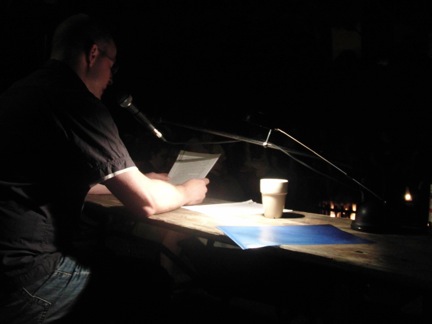
With regard to gaming, which I emphasized as very influential in fantasy, it really does not matter which game you try out, if you decide to try out gaming. Myself I had always very much fun in the Worlds of Dungeons & Dragons for pen & paper or life role playing games and consider computer gaming not important as means to get to know fantasy worlds. (Though I do like computer gaming, right now for example The Witcher 1 + 2, but that may depend on the excellent original characters by Andrzej Sapkowksi.)
Cited Literature:
Attebery, Brian. Strategies of Fantasy. Bloomington: Indiana University Press. 1992.
Dalberg-Acton, J.E.E. Historical Essays & Studies. Ed. By J.N. Figgs. London: Macmillan. 1907.
Le Guin, Ursula K. The Language of the Night. Essays on Fantasy and Science Fiction. Ed. by Susan Wood. New York: Putnam´s sons. 1979.
Mathews, Richard. Fantasy. The Liberation of Imagination. New York, London : Routledge. 2002.
Schneidewind, Friedhelm (Interview). “Sexy Raubtier und Massenmörder.” Weserkurier 10.3.2011.
URL: http://www.weser-kurier.de/Artikel/Freizeit/TV/Reportage/339466/Der-Vampirologe-Friedhelm-Schneidewind-beschaeftigt-sich-im-Interview-mit-%22True-Blood%22,-%22Twilight%22-und-Co..html
Todorov, Tzvetan. The Fantastic. A Structural Approach to a Literary Genre. New York: Cornell University Press. 1975.
Tolkien, J.R.R. “On Fairy Stories.” The Monster & the Critics and Other Essays. London: HarperCollins. 1997. 109-161.
Weinreich, Frank. Fantasy. Einführung. Essen: Oldib 2007.
Weinreich, Frank. “Die Phantastik ist nicht phantastisch.” L. Schmeink (ed.). Proceedings of the First Conference of the Gesellschaft für Fantastikforschung. [in Vorbereitung]

